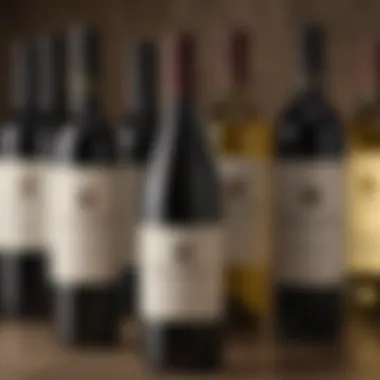Understanding Vegan-Friendly Wines: A Comprehensive Guide


Intro
As the global focus on ethical consumption increases, many individuals are seeking beverages that align with their values, particularly when it comes to diet. One area that has gained traction is vegan-friendly wines. Understanding which wines fit this criteria requires a deep dive into production methods, fining agents used, and labeling practices. This exploration will not only help consumers make informed choices but also clarify common misconceptions about wine and veganism.
In this guide, we will address several key points: the characteristics that define vegan-friendly wines, the role of various fining agents, and the importance of labeling and certification. By the end of this article, readers will have a comprehensive framework for understanding vegan wines, enabling them to enjoy their selections with greater confidence while respecting their ethical commitments.
The wine industry, traditionally seen as exclusive, is evolving. Consumers are now demanding transparency regarding the practices involved in wine production. More than ever, they wish to understand the ethical implications of what they consume and how those choices reflect their lifestyle preferences. This article will navigate through these concepts, presenting a holistic view of vegan-friendly wines and empowering readers with essential information.
Prologue to Vegan Wines
Understanding vegan wines is essential in today's context of ethical consumption and sustainable choices. With more people adopting a vegan lifestyle, the demand for products that align with these values has increased. Wine, often overlooked in this discussion, has a complex production process that can sometimes conflict with vegan principles. This section aims to clarify what distinguishes vegan-friendly wines from conventional ones and why it matters.
Defining Vegan Wines
Vegan wines are made without the use of animal-derived products at any stage of the wine-making process. Traditional wine production often involves fining agents, which help clarify and stabilize the wine but can include substances derived from fish, egg whites, or dairy. Thus, it is crucial to recognize that not all wines are inherently vegan. A wine labeled as vegan has been crafted through methods that employ only plant-based fining agents or has not undergone fining at all. Thanks to the growing awareness, many wine producers have begun adjusting their practices to cater to this segment of the market. The clarity regarding the ingredients ensures that vegans can enjoy wine without ethical concerns.
Ethical Considerations
The ethical implications of vineyard practices and wine production extend beyond just the fining agents used. Choosing vegan wines reflects a commitment to environmental sustainability and animal welfare. Many vineyards prioritize organic growing methods, minimizing chemical use and fostering biodiversity, which is an added benefit for eco-conscious consumers. Moreover, the transparency of ingredient sourcing plays a significant role in consumer choices. As the awareness of how animal products impact the environment rises, the preference for vegan wines can also promote better farming practices overall.
"By understanding the types of wines available, consumers can make informed decisions that reflect their values and lifestyle choices."
Making conscious choices about wine helps in supporting a more humane and sustainable agricultural system. As interest in vegan products continues to grow, it is essential to adapt and learn about what these options entail. This understanding creates a more ethical marketplace and encourages more producers to consider vegan-friendly practices. Ultimately, the choice of wine can be a strategic decision in advocating for broader changes in production methods across the beverage industry.
Wine Production Process
Grapes to Wine
The journey from grapes to wine is intricate. Initially, grapes are harvested, usually during the late summer or fall. Different grape varieties offer distinct flavors and aromas that contribute to the final product. Once harvested, the grapes undergo crushing to extract their juice. This juice then enters the fermentation process, which is crucial for turning sugar into alcohol.
In this stage, juice compounds interact with naturally occurring or added yeast. The yeast consumes the sugars present in the grape juice and converts them into alcohol and carbon dioxide. It is during fermentation that the character of the wine emerges. Factors such as temperature, duration, and grape type play a vital role in determining the wine's style and quality.
Role of Fermentation
Fermentation is not merely a chemical transformation; it is a pivotal moment that defines the wine's essence. Various fermentation techniques can be used, such as open or closed fermentation. Each method can yield different flavor profiles. By controlling fermentation conditions, winemakers can influence the aromatic qualities of the wine.
Temperature control during fermentation is particularly important. Higher temperatures can extract more tannins, giving the wine more structure. This aspect is especially relevant for red wines. Similarly, fermentation time impacts the wine's complexity. Longer fermentation often results in more nuanced flavors, while shorter times may produce lighter, fresher wines.
Understanding the importance of the wine production process, from grape selection to fermentation, lays a foundation for exploring vegan wines. With this knowledge, individuals can better appreciate the nuances involved in wine creation and recognize the significance of each step toward ensuring their choices are ethically aligned.
"Awareness of the wine production process enhances one's appreciation for every sip, particularly when making vegan choices."
Fining Agents Explained
Fining agents play a critical role in the process of wine production, especially when it comes to producing a clear and stable final product. Fining is a technique employed to remove unwanted particles from wine. These may include proteins, tannins, and certain yeast residues. By clarifying the wine, fining agents help enhance its appearance and overall flavor profile. The significance of understanding these agents is paramount for consumers, especially for those following a vegan lifestyle. Knowledge about the fining process can aid in making informed choices regarding the wines they consume.
Fining agents can be derived from both animal and plant sources. Traditional fining agents used in winemaking include substances like casein (derived from milk), gelatin (derived from animal collagen), and egg whites. For a wine to be classified as vegan-friendly, it is essential that no animal-derived agents are utilized in the fining process. Thus, identifying vegan alternatives is crucial for the accessibility of vegan wines to a wider audience.


Clarifying the wine with the right fining agent is essential not only for aesthetics but also for taste.
The choice of fining agents can directly impact the wine's flavor, color, and texture. Understanding these elements allows consumers to appreciate the nuances tied to the production methods behind their selected bottle. As sustainable and ethical consumption gains traction, the demand for vegan wines increases. This highlights the importance of being informed about fining agents in wine production.
Common Fining Agents
- Gelatin - A popular animal-derived fining agent used to clarify wine. It can remove proteins and tannins but is not suitable for those seeking vegan options.
- Isinglass - Derived from fish bladders, isinglass is particularly effective but again, excludes vegan-friendly wines due to its animal origin.
- Casein - A milk-derived fining agent that helps to clarify wine but is not appropriate for vegans.
- Egg Whites - Often used in red wine production, egg whites (or albumen) can refine tannins but disqualify the wine from being vegan-friendly.
Understanding these common fining agents is essential for anyone interested in vegan wines. Consumers should look for alternatives that comply with their ethical considerations.
Vegan Alternatives
Fortunately, there are various vegan-friendly alternatives to traditional fining agents. These alternatives not only serve the purpose of clarifying wine but also align with an ethical lifestyle.
- Bentonite - A type of clay that is effective in removing proteins and is vegan-friendly.
- Activated Charcoal - This agent can help remove unwanted flavors and impurities, thus ensuring a cleaner taste without any animal products.
- Plant-based Fining Agents - Substances derived from plants, such as pea protein, are becoming increasingly popular in winemaking.
- MCC (Modified Cellulose) - A newer alternative that aids in clarifying wine while remaining compliant with vegan standards.
By opting for wines that utilize these alternatives, consumers not only support vegan practices but also enrich their understanding of sustainable winemaking. This knowledge fosters a deeper appreciation for the wines they enjoy and creates a more ethical consumption environment.
Identifying Vegan Wines
Identifying vegan wines is pivotal in the broader discussion of this article, particularly in the context of ethical consumption. Veganism encompasses a lifestyle that avoids not only animal products in food but also in beverages. Thus, it is essential for consumers to discern which wines align with their values. Understanding how to spot vegan-friendly wines ensures that individuals can make choices that reflect their ethical beliefs, which can contribute to a more sustainable environment.
Labeling Standards
In the realm of vegan wines, labeling standards play a crucial role. Unlike food products, wine labels can sometimes be misleading or lack explicit information regarding animal-derived ingredients. Therefore, the presence or absence of clear labels can significantly affect consumer choices.
Many wine producers that follow vegan practices will indicate this on their labels. However, not all wines carry such markings, which complicates the purchasing process. For example, some labels may simply state "no animal-derived fining agents used," while others might have a vegan certification symbol. It is important to note that not every wine that does not explicitly mention animal products can be assumed vegan. Consumers should look for transparency in labeling, as well as contextual information about the wine's production process.
"Certified vegan wines must not have any animal-derived ingredients at any stage of their production."
Moreover, some consumers might encounter labels stating "may contain traces of" which often refers to cross-contact during production. These warnings indicate uncertainty and may deter strict vegans. Thus, understanding the intricacies of labeling is essential for confidently choosing vegan wines.
Certifications and Symbols
Another layer to the process of identifying vegan wines involves certifications and symbols. Various organizations provide certifications for vegan-friendly products, including wines. A recognized vegan certification, such as the Vegan Society's logo, ensures that no animal products were used in any aspect of production, from ingredients to fining agents.
These symbols can also vary by region. For instance, North America may use different certification standards compared to Europe. Familiarity with these symbols can enhance one's ability to identify suitable wines more easily. While some may argue that organic or biodynamic certifications imply a vegan-friendly process, this assumption is not always accurate. Wine makers may use animal-derived substances in their practices that meet organic requirements. Thus, relying on specific vegan symbols is necessary for accurate identification.
When possible, consumers should research brands and their certifications before purchase. Engaging directly with wine producers through their websites or customer service can also clarify uncertainties about their practices. This diligence not only supports ethical consumption but also fosters a deeper connection between the consumer and the producer.
Types of Vegan Wines
The variety of vegan wines available today reflects growing consumer interest in ethical consumption. Knowing the specific types of vegan wines empowers consumers to make choices that align with their values. Understanding these options is crucial for anyone concerned about both the quality and ethical implications of their wine selections. Each wine type caters to different tastes, occasion, and preferences.
Red Wines
Red wines are among the most popular options for vegan consumers. Not only do they offer a spectrum of flavors, but they also carry potential health benefits due to their resveratrol content. Many red wines are naturally vegan, provided no animal-derived fining agents are used in the clarification process. Common grape varieties include Cabernet Sauvignon, Merlot, and Pinot Noir.
When choosing vegan red wines, look for those from vineyards that openly disclose their production methods. Organic red wines tend to have fewer additives, making them a favorable option for vegan drinkers. It's also worthwhile to explore lesser-known varietals, as they often showcase unique characteristics and flavor profiles.


White Wines
White wines also hold an essential place in the vegan wine market. These wines generally present lighter, crisper tastes compared to reds. Varieties such as Chardonnay, Sauvignon Blanc, and Riesling are frequently available in vegan options. Some producers specifically label their wines as vegan, which aids consumers looking for those products.
One advantage of white wines is their versatility with food pairings. Vegan white wines often complement a range of vegan dishes like salads, pasta, and vegetable-based meals. Therefore, they play a significant role in enhancing the dining experience for ethical eaters.
Sparkling Wines
Sparkling wines, including Champagne and Prosecco, are not only celebrated for their celebratory nature but also for their potential to be vegan. The effervescence of these wines can often add an element of festivity to any gathering. However, caution must be exercised when selecting sparkling wines, as some producers may use animal-derived fining agents.
It's advisable to research and choose brands that are transparent about their vegan status. Furthermore, sparkling wines are incredibly suitable for festive occasions, making them a fitting choice for gatherings that prioritize ethical consumption.
Dessert Wines
Dessert wines are typically richer and sweeter, appealing to those with a penchant for indulgence. Well-known varieties such as Port and Sauternes can be vegan-friendly if produced without animal-derived agents. These wines, with their complex flavor profiles, can enhance desserts or serve as delightful digestifs after meals.
For vegan dessert lovers, understanding the classifications of dessert wines is valuable. Many of these wines are produced using various methods, such as late-harvest techniques or botrytization, which can all be vegan-friendly. A thoughtful selection can elevate a dining experience, aligning with ethical principles and enhancing taste alike.
Impact of Wine Choices
Understanding the impact of wine choices extends beyond mere preferences; it encompasses health factors, ethical practices, and environmental consequences. As more individuals select wines with consideration of their ethical values, the relevance of vegan-friendly wines becomes apparent. The choice of wine can signify a commitment to personal well-being and a stand against animal exploitation.
Health Considerations
Choosing vegan wines can occur for various health reasons, including dietary restrictions. Some individuals avoid animal products for health benefits associated with veganism, such as lower cholesterol levels and reduced risk of certain diseases. In considering vegan wines, it is essential to note that many of these beverages are made without additives that could have negative health effects. However, moderation remains key.
When selecting vegan wines, vigilance is important. Some wines can contain added sugars and preservatives that may detract from their health value. Thus, reading labels can guide consumers toward better options.
- Potential Health Benefits:
- Reduced intake of cholesterol
- Fewer artificial additives
- More potential for high antioxidant levels, depending on the type of wine
Avoiding wines that use animal-derived fining agents can also be a move towards healthier choices as these compounds sometimes leave traces that might not align with vegan principles. The growing availability of organic and vegan-certified wines can aid consumers in making healthy choices.
Environmental Impact
The environmental impact of wine production is an often-overlooked aspect of wine choices. Traditional winemaking can involve practices harmful to the ecosystem. Pesticides, herbicides, and other chemical inputs are frequently utilized. Choosing vegan wines can align with principles of sustainability and environmental stewardship.
By opting for vegan wines, consumers may support vineyards that adopt organic or biodynamic methods. These practices promote biodiversity, soil health, and reduced carbon footprints. Additionally, many vegan-friendly producers are conscious about their water usage and waste management, which furthers sustainability.
- Key Environmental Benefits of Vegan Wines:
- Promote sustainable farming practices
- Encourage biodiversity and healthy ecosystems
- Reduce reliance on harmful chemicals
- Support of local vineyards committed to eco-friendly practices
Adopting a lifestyle where one is mindful of wine choices inevitably has a broader effect on the environment. Consumers play a role in challenging traditional practices in the wine industry and prompting more producers to consider sustainable options.
Therefore, each choice of wine presents an opportunity to influence both health and environmental outcomes positively. Individuals become part of a larger movement toward ethical consumption.
Common Misconceptions


Understanding common misconceptions about vegan-friendly wines is crucial for consumers seeking ethical beverage options. Often, people conflate vegan wines with organic wines, and this is a significant misunderstanding that can lead to confusion in purchasing decisions. Moreover, there are assumptions about the taste and quality of vegan wines that may deter individuals from exploring this category.
Vegan vs. Organic Wines
Vegan wines and organic wines are not the same despite certain overlaps. Organic wines are produced from grapes that have been grown without the use of synthetic pesticides or fertilizers. The focus here is on the agricultural practices involved in growing the grapes. In contrast, vegan wines specifically refer to the winemaking process, primarily concerning the absence of animal-derived fining agents used to clarify the wine.
It is essential to note that a wine can be organic but not vegan if animal products are used in the fining process, such as egg whites or gelatin. Thus, consumers must read labels carefully. Brands might highlight organic status, yet it does not guarantee that the wine is vegan-friendly. This distinction is vital for those who are committed to a vegan lifestyle and wish to ensure that their wine choices are in harmony with their values.
"The distinction between organic and vegan wines often leads to confusion among consumers, highlighting the need for clear labeling and greater awareness."
Taste Preferences
Another common misconception is the belief that vegan wines are inferior in taste compared to their non-vegan counterparts. This notion often arises due to limited exposure. Many well-regarded wineries offer vegan options and maintain high-quality standards that ensure flavor. Additionally, the fining agents used in conventional wines do not significantly impact taste or aroma in a way that is immediately perceptible to most consumers.
Taste is subjective and can vary significantly based on individual preferences. Many enthusiasts have found that they enjoy vegan wines just as much as, if not more than, traditional wines. Moreover, the growing market for vegan-friendly options encourages winemakers to experiment with flavors and styles that appeal to diverse palates. As more consumers seek out these wines, we can anticipate an increase in quality and diversity available on the market.
In summary, unraveling these misconceptions is imperative for making informed choices. It empowers consumers to differentiate between the various types of wines and understand what aligns best with their ethical and taste preferences.
Choosing Vegan Wines
Choosing vegan wines is a significant aspect of making ethically sound decisions in one’s beverage selections. This topic highlights the intersection between personal ethics, environmental concerns, and culinary enjoyment. Understanding what makes a wine vegan-friendly ensures that consumers align their lifestyle choices with their values.
Vegan wines offer drinkers a way to indulge without compromising their ethical beliefs. By opting for wines that are free from animal-derived substances, individuals actively participate in a broader movement toward sustainable and responsible consumption. It reflects a conscious effort to consider the implications of food and drink choices.
Moreover, the rise of veganism has prompted wine producers to adapt their methods. This can lead to greater transparency in production practices, encouraging wineries to disclose their ingredients and processes. By choosing vegan wines, consumers reward producers committed to ethical standards. Understanding the nuances of wine selection also helps dispel common misconceptions surrounding vegan options, making it easier to identify quality choices in the marketplace.
Factors to Consider
When choosing vegan wines, several factors warrant consideration to ensure that the selection aligns with personal preferences and ethical criteria.
- Fining Agents: Explore whether a wine was fined with animal-derived agents. While many wines use clay and activated charcoal, some still rely on fish bladder or egg whites.
- Label Transparency: Look for labels that specify vegan certifications. Some brands disclose ingredients clearly, while others may require further research.
- Brand Reputation: Investigate wineries known for their commitment to vegan practices. This often correlates with overall sustainability and ethical production practices.
- Price Point: Vegan wines can range in price. Budget accordingly to avoid compromising on quality for ethical reasons.
- Taste Preferences: Understand personal taste preferences to choose wines that match one’s palate while also ensuring they are vegan-friendly.
Recommended Brands
Selecting from reputable brands can simplify the process of finding vegan wines. Here are several recommended options that are known for their vegan-friendly practices:
- Frey Vineyards: This organic winery in California specializes in vegan wines without any animal-derived components.
- The Vegan Wine Company: A UK-based brand that offers an array of vegan wines sourced from various regions, ensuring full transparency in production.
- Cline Cellars: Known for their commitment to sustainable practices, many of their wines are labeled as vegan.
- Stellar Organics: A South African company that produces certified organic and vegan wines, focusing on environmental sustainability.
- Pine Ridge Vineyards: Offers a selection of quality vegan wines, showcasing rich flavors and attention to detail in production.
Choosing these wines not only supports responsible business practices, but also allows wine enthusiasts to enjoy their selections, knowing they align with ethical values.
Culmination
The conclusion serves as a critical component in the discussion of vegan-friendly wines. This section not only synthesizes the information presented throughout the article but also emphasizes the implications of choosing vegan wines in contemporary society.
As consumers become more conscious of their dietary and lifestyle choices, understanding vegan wines allows for informed decision-making regarding ethical consumption. The rise in demand for vegan-friendly options reflects a broader trend toward sustainability and health awareness. Recognizing that wine can be produced without animal-derived fining agents supports the notion that ethical choices are becoming increasingly accessible.
Future of Vegan Wines
The future of vegan wines appears promising, as the market continues to evolve. Producers are exploring innovative methods to create wines that align with vegan principles. This includes advancements in organic and biodynamic farming, which often incorporate vegan practices naturally.
Consumer demand is expected to drive growth in this sector. Younger generations, particularly millennials and Gen Z, are likely to prioritize transparency in food and beverage sourcing. Their preferences may encourage wineries to adopt more ethical practices as a selling point. As education on veganism and environmental issues increases, so does the likelihood of plant-based alternatives gaining traction.
"The acceleration towards vegan wines signals a shift in the wine industry, where ethical considerations are becoming non-negotiable for many consumers."
As a result, labels and certifications will likely become more standardized, making it easier for consumers to identify vegan options. Educational initiatives by wineries and industry organizations can further enhance awareness and clarity regarding vegan wines.



